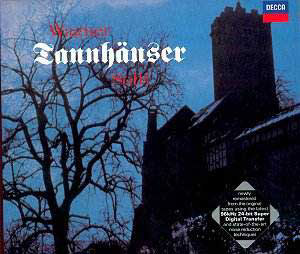Avoid colloquialisms. Never use slang. Be scholarly.
We are all so urged from cradle to grave by teacher, tutor, mentor and
professor. Dear Editor: please on this one occasion, let me offend.
Let me break every such rule and more: let me be ungrammatical with
conjunctions. Dear Editor: I will not err again this year if these transgressions
survive your ‘delete’ button.
‘Wow’. And more ‘Wow’. Absolutely ‘wow’. This is the
single word summary for a recording that will leave you exhausted, exhilarated,
intellectually challenged and emotionally erupting. Therefore, dear
editor and readers, that is why I say that the word for this recording
is: ‘Wow’. With one minor later lapse, here endeth my transgression.
However that is not enough: certainly not when there
is so much to be said about the history of the opera and this recording.
The former does not usually fall within the ambit of a CD review for
a well-known opera. Therefore I shall mention only briefly that as distinct
from the Dresden version, this recording is of the Paris version. You
will recall that until the end of his life Wagner continued revising
this opera. The seriously interesting historical introduction by Patrick
Carnegy and the producer’s note in the booklet accompanying the recording,
explain the background to the choices made for this recording of Wagner’s
later revisions of the Paris version.
The booklet, with its usual full libretto and translation,
also has a page of explanation by the balance engineer of the work of
re-mastering an analogue tape. He refers to the disadvantage that present
hi-fi systems will reveal sound disturbances not audible on earlier,
less refined, equipment. Yes, there are one or two suggestions of such
but they are virtually irrelevant in the context of this superb performance.
It is indeed a superb performance: from the opening
chord to the closing chord. It illustrates the Paris version to very
considerable advantage over the Dresden version. It sends a charge of
electricity crackling around the listener. Here is energy and volatility
captured on tape and now discs; which can all be held back dramatically
for the lyrical passages where smoothness and beauty of tone hold sway.
The Vienna Philharmonic respond magnificently: whether
in overture or prelude, soaring accompaniment or gentle back drop chords.
With Solti in charge this is a truly Wagnerian orchestra. There is musical
power, some haunting dynamics in the quieter string passages and a superb
balance between strings and wind giving rise to riveting contrasts.
Christa Ludwig (Venus) is so seductively smooth and
inviting over the whole of her vocal range that it seems extra-ordinary
that anyone would wish to leave her or her ‘sirens’. She demonstrates
a range of sound from an almost creamy sexuality for the grotto invitation
to a mixture of scorn and anxiety at the prospect of Tannhäuser’s
departure. This is aural characterisation as an art–form.
René Kollo (Tannhäuser) maintains his resolve
in warm heldentenor tones with which he later vocally caresses
Helga Dernesch’s Elisabeth. However the steel in the voice is unleashed
for his scorn and arrogance at the singing contest. For his Act III
tour de force, his sustained power sounds effortless. Plainly it cannot
be so, but it never shows: not a note missed, a leap hesitated over
or a tonal contrast overlooked.
Helga Dernesch responds with purity of sound second
to none. She is note secure to the extent that you do not think about
it. Her welcoming aria upon Tannhäuser’s return from the Venusberg
has glorious sounds and colouring. In the ensembles / recitative and
aria prior to the singing contest, there are some seriously warm low
notes. Later she demonstrates perfect pleading in prayer with tonal
beauty in Allmächt’ge Jungfrau. The balance of her voice
with the male soloists is approaching ideal: as indeed is the totality
of balance between all the singers.
Victor Braun sings Wolfram, the ever-disappointed undeclared
suitor. With the slightest vocal wobble he delivers clarity of tone
and note which matches his fellow soloists. His aria in the singing
contest drips with emotion. Tonal beauty radiates when he finds Elizabeth
at the shrine as does his vocal colouring in his presentiments prior
to Tannhäuser’s return from the pilgrimage.
There is then the delight of what appears to be casting
self-indulgence: Hans Sotin (Landgraf) with his authoritative bass and
outstanding legato; Manfred Jungwirth (Biterolf) with his deep brown
bass; the outstanding Norman Bailey’s heldenbariton (Reinmar);
and the lyrical tenor of Werner Hollweg (Walter). All contribute to
that quite outstanding vocal balance in the ensemble passages. It is
difficult to believe that today there could be assembled such vocal
depth for the less important roles. However this typifies the strength
of this recording.
No details appear to have been overlooked: a comment
that applies equally to the soprano Shepherd boy and the choral contribution.
The producer’s note adds, "New recording techniques were employed
to create a sense of movement in the different arrivals and departures
of the Pilgrims…. and… the opera was unrepentantly planned and prepared
in terms of recording rather than of stage performance." That meticulous
preparation is very evident throughout. It is also a comforting coincidence
that each Act occupies a single disc.
Finally, assuming that I still have the attention of
those without a Wagner recording, who no doubt enjoy all the old Wagner
jokes (‘I was really enjoying the performance until my husband / wife
woke me up’), to them I say : if you have no Wagner recording buy this
one. When you have dipped your toe in the Wagner sea, you too will be
soon swimming in superlatives and who knows, perhaps seeking the other
Solti / Wagner recordings. Even if you go no further you will not regret
this purchase. This is …well… ‘wow’.
Robert McKechnie

